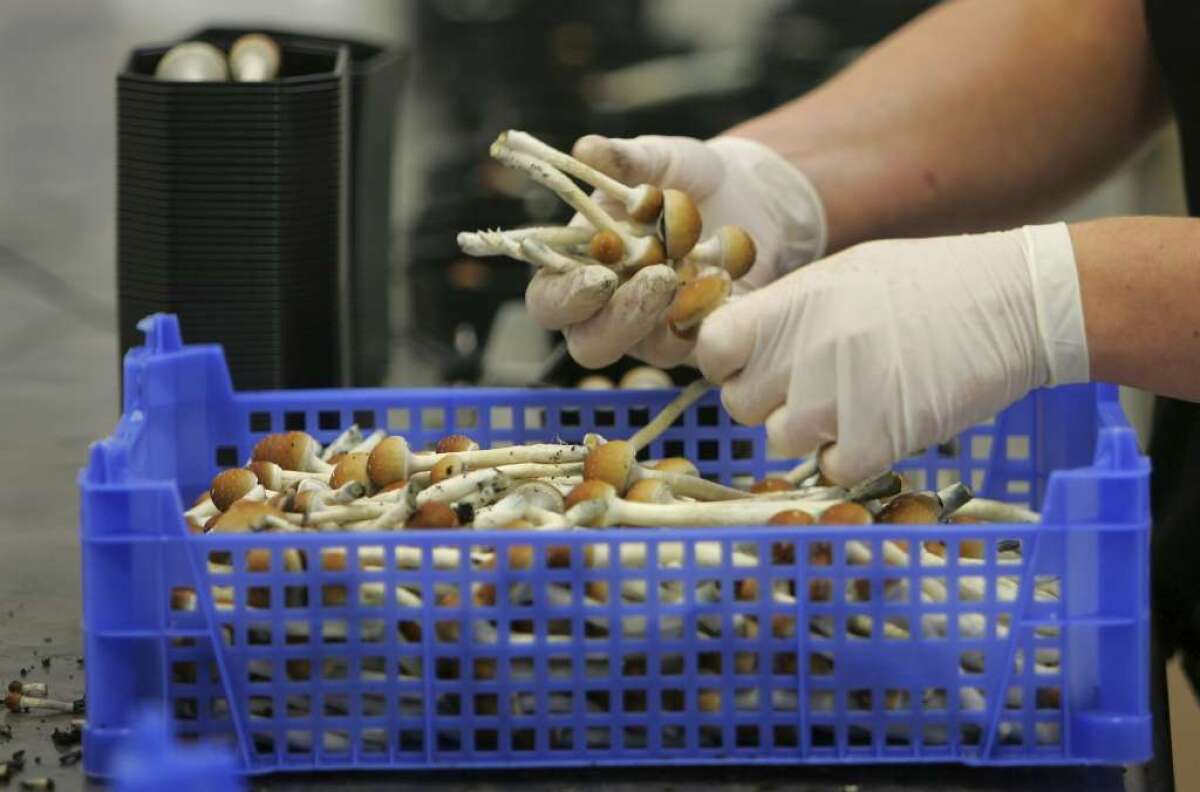Feeling rejected? Mushrooms could help

Psilocybin, the psychoactive ingredient in hallucinogenic mushrooms, appears to reduce the pain of social rejection, a new study says.
Psilocybin, the mind-altering chemical that gives some mushrooms magical properties, can do more than induce trippy states. A new study finds that it reduces the sting of social rejection.
By tracking how, exactly, psilocybin affects the brainâs chemistry and activity levels, the research suggests new ways to treat the faulty social processing that comes with many mental illnesses.
Psychiatric disorders such as depression, borderline personality disorder and social anxiety disorder are often perpetuated by a nasty mind trick: sufferers are inclined to perceive rejection, criticism and negative judgments from people with whom they interact.
That negative bias not only drives those with these conditions to withdraw. By making them testy, thin-skinned and defensive, it prompts even the kindest and most patient of others to reject them, validating and perpetuating their sense of social rejection. It can be a hard cycle to break.
For centuries and the world over, mushroom species containing psilocybin have been ingested during religious rituals. They are regularly credited with giving users an expanded sense of togetherness, and a sense of meaning and purpose in the universe.
In a study published Monday in the journal PNAS, Swiss scientists compared the patterns of brain activation and neurochemical levels in 21 healthy volunteers who, on separate occasions, were given a dose of psilocybin or a placebo while they played a game of âcyberball.â
Cyberball is an online game that ingeniously induces feelings of social rejection in psychological subjects while allowing them to stay still enough to have their brains scanned. Lying in a scanner, a subject is drawn into a visual game of catch with several other players. While the subjectâs newfound cyber-friends initially include him or her equally in the game of catch, over time, the subject is left out more and more and eventually ignored altogether. In the uninitiated, that experience of ostracism typically evokes powerful hurt feelings.
Compared to when they got a placebo, however, subjects getting a dose of psilocybin were remarkably resilient in response to cyberball. And it wasnât just that subjects were too high to notice. Whether they got psilocybin or placebo, subjectsâ responses to post-scan queries were equally aware that theyâd been left out of the game. After getting a dose of psilocybin, subjects just did not respond to that exclusion with the same level of emotional distress.
Generally speaking, subjects reported better moods after taking psilocybin than after they got a placebo. But they also reported greater feelings of âunity,â of a diminished sense of boundaries between themselves and others, and of being connected to, or at one with, the environment.
In the brain, psilocybin binds to a number of different receptors for the brain chemical serotonin. By engaging those receptors, psilocybin almost certainly increases the amount of serotonin lingering in the spaces between brain cells -- an antidepressant effect thatâs pretty predictable. But those same receptors prompt the release of many other neurotransmitters as well. So psilocybinâs effect as a social analgesic could stem from other chemical changes in the brain.
In scans that look at regional activation in the brain, and tests that gauge changes in levels of neurotransmitters, researchers saw that psilocybin notably tamped down activity in some brain regions that are key to processing social pain (the anterior medial cingulate cortex and the middle frontal gyrus). As it did so, researchers saw the neurotransmitter aspartate, which tends to excite certain neurons, plummet. That, in turn, may prompt a cascade of downstream chemical changes in the brain related to the neurochemical glutamate.
The new research on psilocybin is just one of a welter of studies that probe the potential therapeutic value of drugs that are better known as recreational or party drugs. In addition to psilcybin, the widely abused anesthetic drug ketamine (known as Vitamin K), MDMA (also known as E, or ecstasy) and LSD are all being tested by reputable researchers as treatments for depression, anxiety and post-traumatic stress.
Much of that research, like the current study, has been done outside the United States. But after years of not allowing such research, the Food and Drug Administration has approved a handful of such studies in the United States.
The current study appeared to use psilocybin less as a potential treatment and more as a way to elucidate how a difficult symptom of mental illness might be addressed. So itâs unlikely to lead to the widespread use of mushrooms as a treatment for social rejection.
The naturally occurring compound psilocybin (4-phosphoryloxy-N,N-dimethyltriptamine) was isolated, and for years marketed and sold, by the pharmaceutical company Sandoz. It can also be produced synthetically. In the current study, it was administered at a dose of 0.215 mg/kg of weight.
In short, the new research suggests that treating psychiatric disorders such as anxiety and depression may take more than just lifting mood, as the most widely prescribed antidepressants do. It points to the importance of tamping down hypersensitivity to social rejection as a crucial step in treating those disorders. And it hints that doing so may require more than just boosting the availability of serotonin -- again, as the most widely prescribed antidepressants do -- but also finding ways to make the brain more resilient in the face of social slights.
Follow me on Twitter @LATMelissaHealy and âlikeâ Los Angeles Times Science & Health on Facebook.




